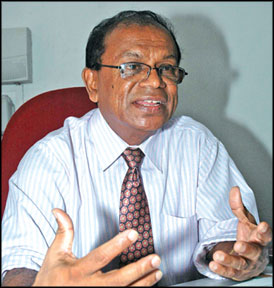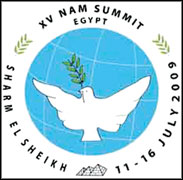|
NAM marks 49 years:
NAM: Voice of emerging nations
Senior Professor of the Political Science and Public Policy
Department, Colombo University and National Centre for Advanced Studies
in Humanities and Social Sciences (NCAS) Director Prof Laksiri Fernando
speaks on the role of the Non-Aligned Movement (NAM) to Charnika
Munasinghe.
Q: Could you elaborate on NAM’s formation, philosophy and its
significance?
A: NAM is an intergovernmental organization within and also
outside the UN system of 118 countries. All are from the South Asia,
Africa and Latin America - except for Belarus. There are 53 African
countries, 38 Asian countries and 26 Latin American countries. Fiji will
be its newest member. NAM therefore is a movement of emerging developing
countries and third world countries.
 |
|
Prof
Laksiri Fernando |
 NAM represents 55 percent of the world population and 25 percent of
the world economy. It is nearly two third of the UN member countries.
There are 19 observers including China. China has been a continuous
supporter of NAM. The last NAM Summit was in Egypt in 2009. The next one
will be in Iran in 2012. NAM doesn’t have a permanent structure and
there is no charter or a constitution. It works on the basis of policy
declarations and agreed principles. It is a heterogeneous body, working
on a broad platform. It started with 25 members and it has grown into
118 members. This is the largest intergovernmental organization after
the UN. NAM represents 55 percent of the world population and 25 percent of
the world economy. It is nearly two third of the UN member countries.
There are 19 observers including China. China has been a continuous
supporter of NAM. The last NAM Summit was in Egypt in 2009. The next one
will be in Iran in 2012. NAM doesn’t have a permanent structure and
there is no charter or a constitution. It works on the basis of policy
declarations and agreed principles. It is a heterogeneous body, working
on a broad platform. It started with 25 members and it has grown into
118 members. This is the largest intergovernmental organization after
the UN.
The pronounced broad philosophy of NAM is the middle path which is
very close to our traditional wisdom, avoiding extremes and chartering a
middle way of thinking and action. Non alignment does not mean passive
neutrality.
Non alignment meant ‘neutrality’ between the two Super Powers - the
US and USSR. It was not neutral on issues such as colonialism, racism,
external interference or poverty. NAM has taken strong positions on
those issues.
NAM was formed to oppose the cold war. The bipolarization between the
two Super Powers was considered dangerous. NAM was formed as a third
force to neutralize the tensions between the two and avoid a Third World
War. It did succeed. But the objectives were much more.
Emerging nations - India, Sri Lanka, Indonesia, Egypt, and Ghana -
wanted a common platform to oppose international injustices. The threats
were mainly from the West.
Q: The movement has no constitution and permanent secretariat,
how does NAM operate?
A: NAM operates mainly within the UN system as a lobby group.
It is also a solidarity association outside the UN. It believes in
multilateralism. It is also a forum for bilateral discussions and
negotiations between member countries. At the last summit in Egypt, the
Indian Prime Minister and the Pakistani President met to improve their
relations. Egypt and Iran improved their relations and Egypt requested
Iran to host the next summit. They were rivals.
Triennial summit is the main policy making body. A summit is held for
a week. Many discussions are held and declarations are made. Havana
Declaration in 1979 was a landmark. It was a strong pronouncement
against neo-colonialism. NAM is a movement. A final document at a summit
is always agreed upon. The documents can be viewed through its website.
These are policy documents and they are by and large acted upon by
member countries particularly within the UN system.
The host country of a summit takes the organizational
responsibilities of NAM for the next three years. That country becomes
the Chair of NAM for that period. The Head of State of that country
becomes the NAM Secretary General for the same period. The Foreign
Ministry of that country facilitates the activities of NAM between two
summits. There is always a Bureau for NAM in New York which is hosted by
the Chair. Egypt handles these organizational responsibilities at
present.
NAM also works through several working groups. They meet during
summits and even in between. One such working group is on the subject of
“UN Reforms.” NAM is firmly committed to the UN and its Charter. It is
critical of the UN structures and some of its present functions. The
Foreign Ministers meetings is an important forum of NAM.
Q: Sri Lanka hosted the 5th Summit, How significant was it for
Sri Lanka?
A: The event was extremely significant for Sri Lanka. It was a
high point in Sri Lanka’s foreign policy. It was particularly
significant because the SLFP was in power and Mrs Bandaranaike was the
Prime Minister. She was also the Foreign Minister. The Foreign Ministers
meeting was held in 1974 prior to the summit in 1976. There has always
been a major difference between the SLFP and the UNP on foreign policy.
The UNP was always pro Western.
That time NAM’s main political thrust was in support of liberation
movements. Sri Lanka came to prominence in supporting those movements in
South Africa, Namibia, Rhodesia, Angola and Mozambique. Sri Lanka
invited African Nelson Mandela of the National Congress (ANC) to the
Colombo Summit. Mrs Bandaranaike addressed the UN General Assembly in
1976 as the Chair of NAM. That was a high point in our country’s foreign
policy. Today, President Mahinda Rajapaksa is strongly supporting the
Palestinian cause through NAM.
Q: What is your opinion of NAM’s role during the 30 years of
war on terror in Sri Lanka?
A: NAM supported Sri Lanka’s stand as Sri Lanka is a like
minded country of NAM and NAM has been a friend of Sri Lanka throughout.
The founding principles of NAM are for sovereignty and territorial
integrity of member countries and it is against separatism. All
countries that opposed Sri Lanka are non NAM members. Several NAM
countries firmly supported Sri Lanka in its war against terrorism such
as India, Pakistan, Iran and Malaysia. NAM countries firmly supported
Sri Lanka last year against the attempts by some Western countries at
the Human Rights Council in Geneva in May 2009. The last NAM summit was
held after two months in July 2009. It said “the Human Rights Council
should not allow confrontational approaches, exploitation of human
rights for political purposes, selective targeting of individual
countries for extraneous considerations and double standards in the
conduct of its work.”
Q: After the collapse of the Soviet Union, there were doubts
about the actual need for NAM?
A: There was speculation to this effect briefly after the end
of the Cold War. There is hot war in the Middle East. The West invaded
Afghanistan in 2001 and it was a disproportionate reaction to Al Qaeda
attacks in New York. Then in 2003, the West invaded Iraq and created
mayhem. If not for NAM there is no genuine and independent voice against
these invasions and violations.
Bipolar world was dangerous during the Cold War. But unipolar world
after the Cold War is more dangerous. NAM has many objectives.
Solidarity between emerging nations is one. A new economic world order
is another. There had been three vibrant NAM summits since the end of
the Cold War. The last summit discussed the international economic
crisis and the way forward for the emerging nations. NAM demands
structural changes in the World Bank, IMF and WTO. The need of NAM is
greater today than before.
Q: How do you see NAM’s future and Sri Lanka’s position in NAM
as a member?
A: NAM has a great future. It has to close ranks. The
structures should be strengthened. It has a future in economic
development, poverty alleviation, proper human rights, creating
political stability and ensuring environmental protection. The world
should be democratic. Most Western countries are democratic internally
but not externally. NAM has a role to play.
Sri Lanka is an important member of NAM and Sri Lanka can immensely
contribute to its future while benefiting from its protection against
undue interference from certain Western countries. The next summit will
be in Iran in 2012.
Sri Lanka could host the summit following that in Colombo or
Hambantota in 2015. By that time Sri Lanka will be different, President
Mahinda Rajapaksa can be the Chair and the NAM Secretary General.
|



